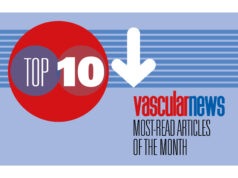The oral anticoagulant rivaroxaban (Xarelto, Bayer Healthcare) has been recommended by the European Committee for Medicinal Products for Human Use (CHMP) for the treatment of deep vein thrombosis (DVT) and prevention of recurrent DVT and pulmonary embolism following an acute DVT in adults, as well as for the prevention of stroke and non central nervous systemic embolism in adult patients with non-valvular atrial fibrillation.
“The decision to recommend rivaroxaban for these new indications underscores the positive risk benefit profile seen in trials testing rivaroxaban against the current standard of care to prevent blood clots in patients with non-valvular atrial fibrillation and deep vein thrombosis,” said Keith Fox, professor of Cardiology at the University of Edinburgh, Scotland. “This news is important for patients and their physicians because there is a clear need for effective therapy options which are not restricted by the limitations of current treatments.”
The current standard of care for the treatment of venous thromboembolism (VTE), including DVT and pulmonary embolism, is low molecular weight heparin injections followed by a vitamin K antagonist, such as warfarin, these are also used as standard therapy for stroke prevention in atrial fibrillation. Heparins require administration by injection, which can cause inconvenience and discomfort. Vitamin K antagonists can be difficult to manage with regularly changing doses and many interactions with food and other drugs among their limitations.
Rivaroxaban has the potential to replace the dual-drug approach in deep vein thrombosis treatment with a single-drug approach that can potentially simplify the patient pathway and improve efficiencies in delivering treatment to patients in need.
Approval by the European Committe in these new indications is expected to follow in the fourth quarter of 2011.
“Patients have waited over 50 years for new treatments which offer an alternative to traditional therapies that can have limitations such as routine monitoring and regular injections, as well as dietary challenges and interactions with other treatments,” said Eve Knight, co-founder and CEO of AntiCoagulation Europe. “Today’s recommendation for rivaroxaban is another welcome signal that alternative anticoagulants have arrived in Europe.”
The positive recommendation for rivaroxaban in the treatment of DVT and the prevention of recurrent DVT and pulmonary embolism following an acute DVT, follows submission of data from the landmark phase III EINSTEIN-DVT study presented at the European Society of Cardiology (ESC) congress in August 2010, as well as data from the phase III EINSTEIN-Extension study, presented in December 2009 at the 51st Annual Meeting of the American Society of Hematology (ASH). Both EINSTEIN-DVT and EINSTEIN-Extension were published in the New England Journal of Medicine in December 2010.
The CHMP recommendation to approve rivaroxaban for the prevention of stroke and non central nervous systemic embolism in patients with non-valvular atrial fibrillation is based on the important clinical benefits demonstrated in ROCKET AF, a double-blind global phase III study that compared once-daily rivaroxaban with warfarin in more than 14,000 patients. The results from the ROCKET AF trial were presented at the American Heart Association (AHA) congress in November 2010 and published in the New England Journal of Medicine in August 2011.
Rivaroxaban is currently indicated for the prevention of venous thromboembolism (VTE) in adult patients undergoing elective hip or knee replacement surgery.













